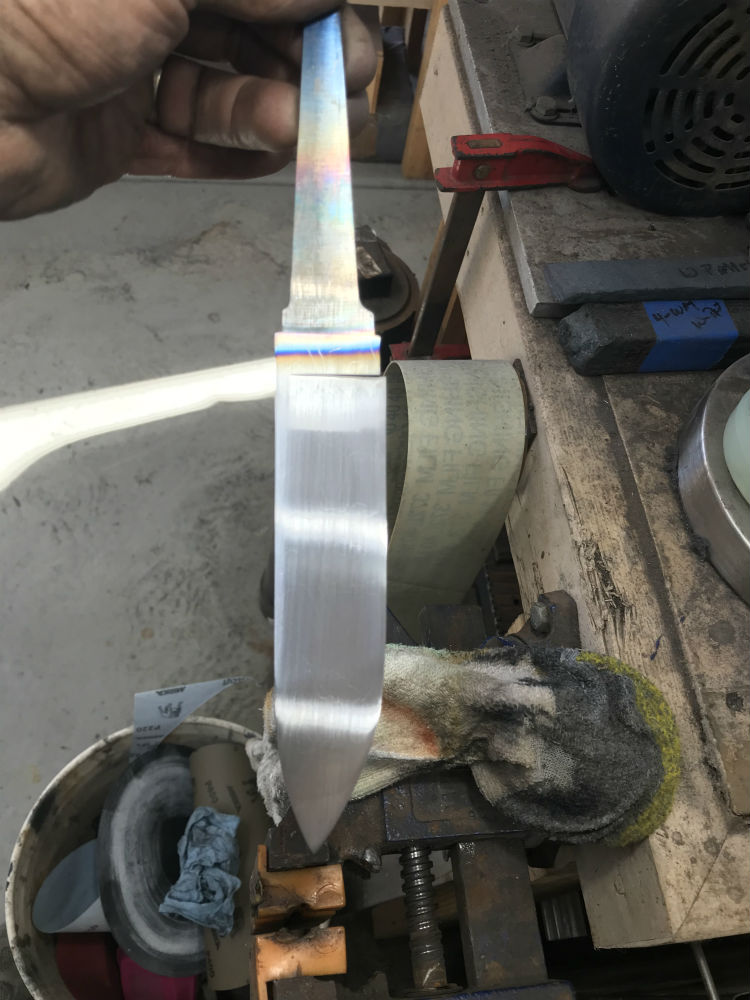I have 2 knives forged from 5160 new stock. Most likely use will be camping or bush craft . Should I edge quench or full quench the blade? And why ?so I can learn
Hi Mike and welcome. You will get a lot of different answers from different people on how "proper" heat treatment should be done. I will give you my opinion, take from it what you will.
I fully quench every knife I make and that includes the tang area as well. Then I temper the entire knife at whatever temperature is appropriate for the steel and intended use. (see this thread for HT info and this for the ITT diagram)For your intended use I would suggest tempering somewhere around 350*F-400*F for a more "tough" temper. (other opinions may differ so pick your favorite)I then draw back my tangs (on all knives) for guard/furniture fitting and more resilience.
The reason I do it this way is to avoid any hard phase transitions in the knife structure. You often hear about the different phases (martensite, bainite, pearlite, etc.) I prefer to make everything uniform and control what areas I reduce through applied localized heating. When I draw back a tang after tempering, I do it with a standard propane plumber's torch and it comes out looking like this.
Joshua States
www.dosgatosforge.com
https://www.youtube.com/channel/UCdJMFMqnbLYqv965xd64vYg
https://www.facebook.com/dos.gatos.71
Also on Instagram and Facebook as J.States Bladesmith
“So I'm lightin' out for the territory, ahead of the scared and the weak and the mean spirited, because Aunt Sally is fixin’ to adopt me and civilize me, and I can't stand it. I've been there before.â€
I am in the same boat as Joshua. It makes sense to me that if you want the full strength and toughness from 5160 I would want the hole blade heat treated properly. I think the main reason people edge quench is too get a temper line on the blade. Which from a selling point of view probably sells quicker then a plain so called boring looking blade. Even though I think a plain carbon steel blade with a clean satin finish looks better then anything.
Want to see more of my work follow me on Instagram:JasonVolkertKnives
Want to get in touch with me [email="[email protected]"]Email[/email] me.
Tempered martensite is very strong.
Karl B. Andersen
Journeyman Smith
|quoted:
Tempered martensite is very strong.
Why settle for anything less? <img src=' http://www.americanbladesmith.com/ipboard/public/style_emoticons//laugh.gi f' class='bbc_emoticon' alt=':lol:' />
Joshua States
www.dosgatosforge.com
https://www.youtube.com/channel/UCdJMFMqnbLYqv965xd64vYg
https://www.facebook.com/dos.gatos.71
Also on Instagram and Facebook as J.States Bladesmith
“So I'm lightin' out for the territory, ahead of the scared and the weak and the mean spirited, because Aunt Sally is fixin’ to adopt me and civilize me, and I can't stand it. I've been there before.â€
Full quench, with appropriate temper. As has been pointed out by the others here, tempered martensite will give you the best optimization of strength to toughness, but I could give you the underlying reasons if needed. I never edge quench, I don't even teach it anymore.
"One test is worth 1000 'expert' opinions" Riehle Testing Machines Co.


